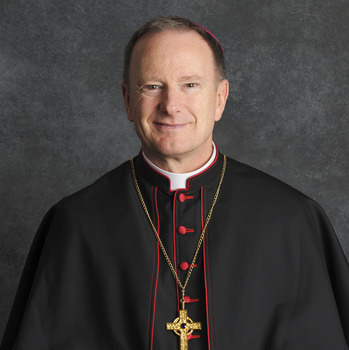The “before and after” difference of Christianity
-

"I went to Lourdes – to prepare for my resurrection."
Cardinal Newman said that "Christianity is a religion of differences, yes and no differences." This refers not only to how different Christianity is from other religions but to the difference that Catholic sacraments make to the people who receive them.
For example, when it comes to the Eucharist, the consecration of the elements makes a before and after difference to the bread and wine, turning them into the Body and Blood of Christ.
My brother, Father Stephen, and I recently attended the funeral Mass in Sacramento of Father Liam McSweeney, who served at our parish 60 years ago when we were altar boys. Father McSweeney spent many years as chaplain to the teen inmates of Juvenile Hall, California Youth Authority. One Christmas morning Father was celebrating Mass for the inmates, and because it was Christmas, so many additional youths came to Mass that he began to run low on hosts while distributing Holy Communion.
Seeing this, one of the servers went into the sacristy and brought out the box of wafers from the closet. "Do you need some extras, Father?" the young man asked.
"Now Johnny, you know we cannot use those because they haven't been consecrated" Father replied. "I know" the fellow answered, "but these boys will never know the difference."
 Bishop Michael C. Barber, SJ, preached this homily in May 2025 at the concluding Mass for 400 pilgrims attending the Order of Malta Pilgrimage, many of whom were suffering from terminal illnesses, at the historic Basilica of the Immaculate Conception in Lourdes, France. Photo courtesy Bishop Michael C. Barber, SJ.Of course there's a difference. When the Holy Spirit is invoked upon the bread and wine during Mass they become the Body and Blood of Christ.
Bishop Michael C. Barber, SJ, preached this homily in May 2025 at the concluding Mass for 400 pilgrims attending the Order of Malta Pilgrimage, many of whom were suffering from terminal illnesses, at the historic Basilica of the Immaculate Conception in Lourdes, France. Photo courtesy Bishop Michael C. Barber, SJ.Of course there's a difference. When the Holy Spirit is invoked upon the bread and wine during Mass they become the Body and Blood of Christ.If we strongly believe in the before and after difference in the Eucharist, why are we slow to believe in the before and after difference in us following baptism and confirmation?
In the Acts of the Apostles, we read of St. Peter and the other apostles huddled behind locked doors in the Upper Room.
What were they afraid of? Death.
They were afraid that what happened to Jesus was going to happen to them (and indeed almost all of them were later captured and executed). Then the Holy Spirit came upon them at Pentecost, and their fear was gone. They went out boldly proclaiming the lordship of Jesus Christ, risen from the dead.
Why were they not afraid? Because they finally understood what Jesus taught, that the resurrection from the dead would happen to them. They were indestructible. You can't kill me! I cannot be destroyed.
This is the central teaching of the Catholic faith. "Dying He destroyed our death. Rising He restored our life" (Mass formula). “For God so loved the world that He gave His only Son, so that everyone who believes in Him might not perish but might have eternal life.” (Jn 3:16)
The first purpose of this pilgrimage is to take away your fear of death.
If you have been baptized and confirmed, you have received the same Holy Spirit that came upon Mary and the apostles at Pentecost. The benefits that applied to them, apply to you. And the principal benefit is resurrection from the dead.
Now our vocabulary should match our faith. When we go up to receive Holy Communion, we don't say "I'm going up there to get a sip of wine." No. We say "I'm going to receive the Blood of Christ."
So when people ask you why you went to Lourdes, you don't say "I have cancer, and I went to prepare for my death." No. You should say "I went to Lourdes – to prepare for my resurrection."
"But Father, how do I deal with all this suffering while I await my resurrection?"
I know it is not easy. It was not easy for Jesus, either.
To understand something of the mystery of suffering, let's look at what Jesus said and did at His agony in the garden. He was so upset that his sweat became as drops of blood.
He prayed to the Father twice. The first time Jesus prayed, "Father, if it be possible, let this cup pass from me." He didn't want to suffer and die. So when you come to Lourdes it is perfectly all right to pray for a cure. You can exclaim with the blind beggar, "Jesus, Son of David, have pity on me!" (Lk 18:38)
But then Jesus goes back and prays to the Father a second time. And this time Jesus is filled with so much love and trust for His Father, and knows how much the Father loves Him, Jesus can add, "But not my will, but Thine be done." Jesus trusts that the Father knows better.
Where did Jesus learn this? I believe he learned this trust from his mother Mary. It was she who said to the angel Gabriel, “Let it be done to me according to your word.” (Lk 1:38)
The French philosopher Simone Weil said, "No amount of human achievement can ever save the world, but only the passion of Jesus Christ. I want to be part of it."
Friends, by accepting the cross of serious illness, you are participating with Christ in the salvation of the world. Your suffering has meaning. St. Paul taught, "Now I rejoice in my sufferings for your sake, and in my flesh I am filling up what is lacking in Christ's afflictions for the sake of His body, that is, the church." (Col 1:24)
Cardinal Newman said, "If I am in sickness, my sickness will serve Him.… I cannot be thrown away."
It is not easy. But you do not suffer alone.
When St. Bernadette was enduring her terminal illness, the sisters in her convent urged her to return to Lourdes and bathe in the healing waters. Bernadette replied, “The waters are not for me.” Our Lady had told her during one of the apparitions, “I do not promise to make you happy in this life, but in the next.”
And in this life Our Lady accompanies us until we leave for the next.
Eastern icons of the Blessed Virgin Mary, the Theotokos (God-bearer) all have one thing in common. Mary's eyes are sad. Even when she is holding the Christ child, she does not smile.
I believe Our Lady's eyes are focused on her Son, hanging on the cross. She is there, at the foot of the cross, sharing in the passion of her Son. That is the expression I see in her face. And her eyes are also looking at you, her sons and daughters, as you mount your cross. Hear her say to you, "I know what you are going through." "I understand." And "I will never leave you."
